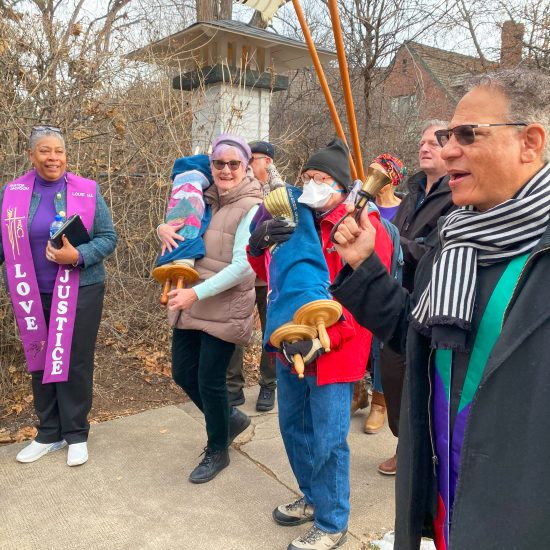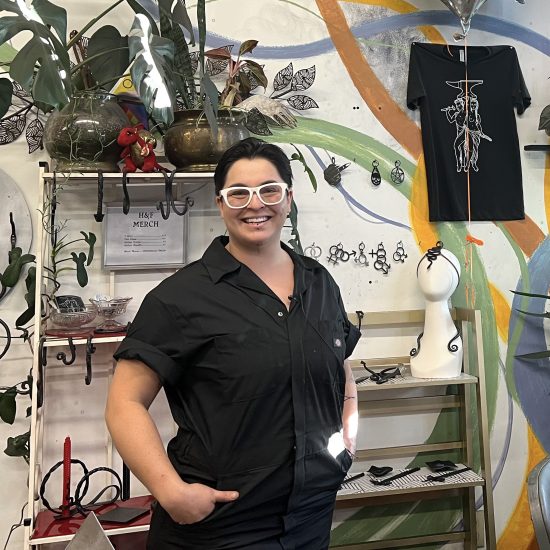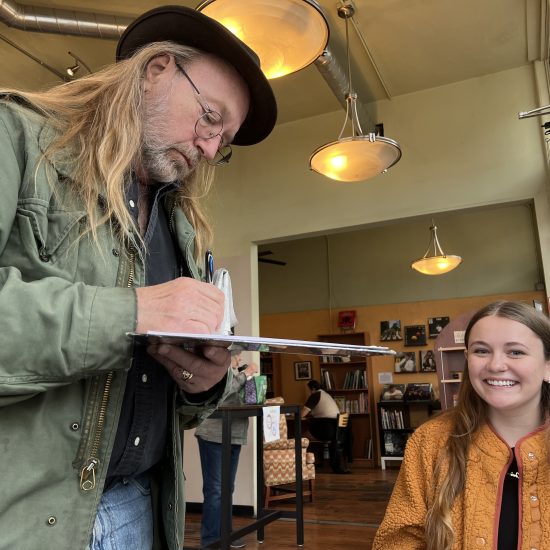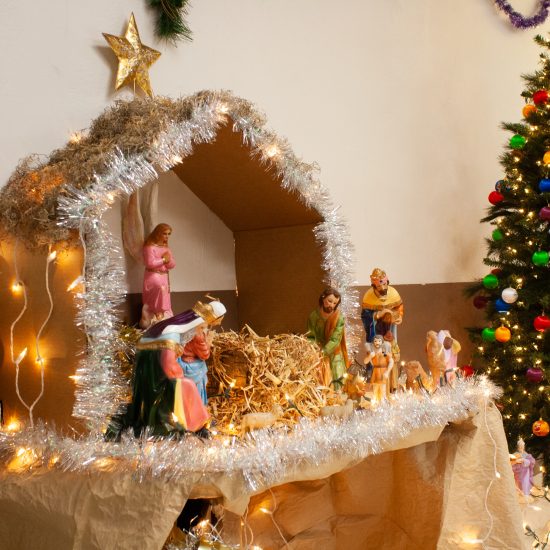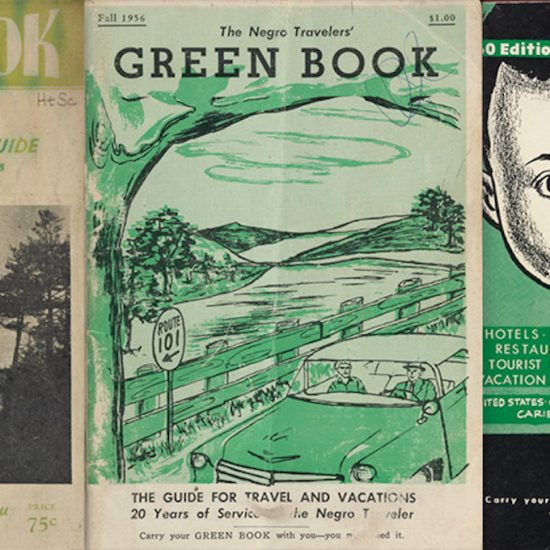
Kelly Grutsch grew up Catholic in California and attended Catholic school as a child. She described her childhood experience with the church as “in your face,” with many restrictive rules.
“You have to obey the Ten Commandments. You have to go to confession. If you do anything wrong, you have to say three ‘Hail Marys’ and 10 ‘Our Fathers.’ And then you’re good to go until the next sin. I almost turned my back on religion altogether until I started searching more,” she said.
As someone who identifies as a member of the LGBTQ+ community, Kelly sought a more inclusive Christian church. Though it varies by sect and denomination, Christian churches and youth ministries have a bumpy history with the LGBTQ+ community, leaving many queer Christians feeling ostracized and likely to turn away from Christianity altogether. The Catholic church has slowly made progress toward accepting queer members in the past several years—Pope Francis suggested blessings for same-sex unions may be possible in the future. However, evangelicals have remained largely steadfast in their beliefs that the Bible is to be taken as the literal word of God and that homosexuality is a grave sin.
Founded in Colorado Springs, the most popular Evangelical youth ministry in the country, Young Life, hangs on to policies that bar individuals who identify as LGBTQ+ from employment. To hold a leadership position in the organization, members must sign a contract that states they are heterosexual, prompting ex-members to launch a campaign for broader inclusion, #DoBetterYoungLife. Such a rocky history has left many queer Christians wondering: What do you do when “love thy neighbor as thyself” feels conditional?


In 1973, Metropolitan Community Church of the Rockies sought to answer this dilemma, throwing open its doors as Denver’s first gay church. The congregation boasts a 50-year history of welcoming people from all identities and intersectionalities, according to their website. The Denver church is part of the Universal Fellowship of Metropolitan Community Churches, which was founded in 1968 and specifically focused its outreach to queer Christians. Although most members of MCC churches are queer, it is by no means a requirement. The MCCR church welcomes allies and people from all walks of life.
“A lot of our LGBTQ members came here because they had negative experiences in the churches that they grew up in, and this is a church that meets their needs,” said James Evans, who works as the worship team lead at MCCR. “Discussions in churches that are very vocal about LGBTQ issues, particularly trans issues, have been very hurtful to members of the community.”
Evans explained that over the years, their church has shrunk in membership in a big way, from well over 100 members in the ‘80s to just 38 today.
“All churches today are having difficulties,” Evans said. “People are realizing they can get their spirituality in other ways. Most of our congregation and regular members are older. We don’t have a lot of younger people because most of them are looking for other ways to experience spirituality.”
According to the latest Gallup poll, church attendance levels are about 9% lower in 2023 than in 2012. Despite shrinking membership, MCCR provides critical resources to the LGBTQ+ community in Denver. They host a 31-member LGBTQ+ Alcoholics Anonymous group and serve 262 people through their weekly food pantry.
“Within the LGBTQ community, alcohol and drugs are a serious problem. A lot of LGBTQ people have suffered from deep trauma through family or societal means,” Evans said.
For the church’s Monday food pantry, they partner with Colorado Prime Timers, a group of older gay men who provide food monthly.
“I get a lot of calls from people that say, ‘You’re only open on Mondays.’ There’s a huge need in the community,” Evans said. “So I’m constantly looking for more volunteers from the community who could come in and maybe help us open another day.”
Kelly Grutsch has been a member of MCCR for 15 years, joining with her wife after moving from California, where she was also a member of an MCC church. She sings in the church’s chorus and serves on the board. Through her involvement, she’s noticed the decline in membership.
“At one time, we had a couple hundred members. Over the years, it’s just dropped. The reason our membership has dropped is because more churches are open now. They are more accepting. So there’s less of a need for a ‘gay church,’ if you will. If you read the news, the Pope is blessing same-sex marriages. So people have decided they don’t have to trek all the way across town. There’s this Protestant church here, another one there; they may not be able to have weddings or be fully inclusive, but they are accepting.”
Grutsch did point out that there is a noticeable difference between churches that simply tolerate the queer community and those that affirm them, and it is important to do your research to find a good fit. Other notable LGBTQ-affirming churches in Denver include House for All Sinners and Saints, Highlands Church, and Columbine United Church.

Photo courtesy of Gaertner.

Photo courtesy of Gaertner.
Katie Gaertner, attended seminary school at the Iliff School of Theology to be a youth pastor. In 2014, Gaertner accepted a job at Columbine United Church. One of the biggest roles CUC plays in supporting the LGBTQ+ community is in having trusted adults support children and teens who are developing their sexual and gender identities. At a church she worked at prior, Gaertner watched the opposite unfold, causing her to leave her position.
“Working with kids and youth who are figuring out their identities, I was struggling, and I asked for resources,” Gaertner said. “I was told we don’t talk about it: ‘Tell them they need to talk to their parents, and this is not part of your role.’ [Going into my job interview] at CUC, one of my questions was, ‘How do you handle people that identify as gay or lesbian?’ I had decided that I was not going to work anywhere that didn’t lift those people up, acknowledge them, talk about it, and make them feel safe. And they were very pleased that this was important to me because it’s important to the church.”
CUC participates in Pride parades every year and also has a “Praise Band,” a nontraditional ensemble that performs at Pride and even does drag performances. Despite the issue of shrinking church membership, queer Christians remain optimistic and their communities remain strong.
“We’re all children of God. God has no stepchildren, and we’re here for all people,” Evans said. “We’re here to help. To walk with you. We don’t have all the answers, and we’re not going to beat you into believing a certain doctrine, but we are here to walk with you in your spiritual journey. There’s something about coming together as a community that everyone should try.”


